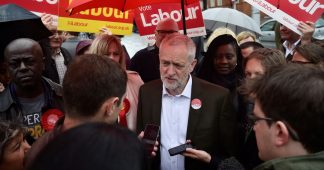How Labour Lost the Working Class
For a hundred years Teesside was the steel capital of the world and a Labour heartland. Now, for the first time in generations, it’s turning blue.
by Joe Zadeh
04 June 2017
A sombre mood clouds the northern town of Middlesbrough. This region takes football very seriously, and last night their team was relegated from the Premier League. Tonight, in a pub near the train station, a man performs The Mavericks’ “Dance the Night Away” on the karaoke to an audience of eight or nine, including a group of three young lads, an elderly couple sitting in silence, a girl smoking outside but listening through the window, and me. He doesn’t look at the lyrics on the screen – he knows them. His eyes are closed, and as his gravelly voice misses almost every note it gives the 90s hit a weird shade of melancholia.
The town has had to deal with one shock already this week. Three days before I arrived, Labour-dominated Tees Valley (a combined authority of Middlesbrough, Darlington, Hartlepool, Redcar and Cleveland, and Stockton-on-Tees) rocked political expectations by electing a Tory Mayor.
Read more at https://www.vice.com/en_uk/article/ev445j/how-labour-lost-the-working-class
It’s a myth that Labour has lost the working class
Dec. 10, 2019
If you were to go by British political programming, there’s only one kind of battleground that matters in this general election. Forget about Liberal Democrat/Conservative marginals in the south-west (snoozefest), don’t worry your pretty little head about the SNP, and who gives a stuff about Northern Ireland when their MPs aren’t propping up an English prime minister? All eyes are turned to the “red wall” – a phrase absolutely no one was using a month ago. It’s a collection of Labour-held leave-voting seats in the north and Midlands, populated solely by Workington man. Or so believes a certain breed of Westminster journalist who loves an opportunity to airily homogenise those bits of the country which aren’t yet served by the Victoria line.
Read more at https://www.theguardian.com/commentisfree/2019/dec/10/myth-labour-lost-working-class-pollsters
How Labour lost working class support in UK’s ‘left behind’ regions
December 9, 2019
Labour is battling to retain a number of seats that have long been the party’s strongholds in the upcoming UK general election. Many of these areas are in the North of England and Midlands. They are post-industrial parts of the country where there was a substantial vote to leave the European Union in 2016. Boris Johnson’s Conservative Party is leaning heavily on this, with its promise to “get Brexit done”.
To understand the appeal of Brexit in these areas and the disillusionment with Labour, we need to understand the huge economic challenges they face. Much of this is the result of austerity. More than simply public spending cuts, it’s important to recognise austerity as an economic model, which was first introduced by Margaret Thatcher’s government in the 1980s and has been embedded into the UK’s economic and social landscape since.
Read more at https://theconversation.com/how-labour-lost-working-class-support-in-uks-left-behind-regions-128332
From the Greek revolt to the Battle of England: hopes and difficulties of the European (radical) left
By Dimitris Konstantakopoulos
Dec. 8, 2019
In a previous article we discussed some of the most critical geopolitical consequences of the outcome of the 12 December British election. In this paper we will discuss the main factors which may impede the Labour Party from getting a majority and what historic experience indicates as the main keys for claiming hegemony. We will also examine the Brexit and EU question, under the light of the accumulated experience of a decade of unsuccessful efforts to oppose neoliberalism in Europe and the related strategies (or no strategies!) of the European Left. We are going also to discuss some very important aspects of the economic program of Labour, which represents the biggest hope of a break with catastrophic Neolibearlism in Europe, since 1981.
Read more at http://www.defenddemocracy.press/from-the-greek-revolt-to-the-battle-of-england-hopes-and-difficulties-of-the-european-radical-left/











